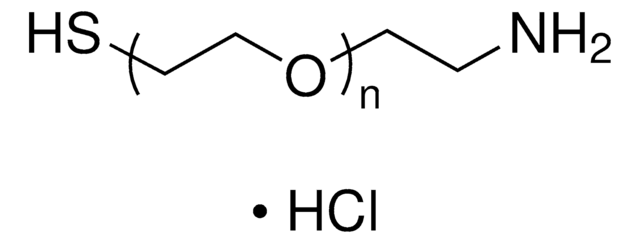757810
Poly(ethylene glycol) 2-mercaptoethyl ether acetic acid
average Mn 1,000 (n~22), cross-linking reagent amine reactive, cross-linking reagent thiol reactive
Synonyme(s) :
Polyethylene glycol, mercaptoPEG acid, mercaptopoly(ethylene glycol) carboxylic acid, mercaptopolyoxyethylene acetic acid, thio-PEG, thiol-PEG-acid, thiol-PEG-carboxylate
About This Item
Produits recommandés
Nom du produit
Poly(ethylene glycol) 2-mercaptoethyl ether acetic acid, average Mn 1,000
Forme
solid
Poids mol.
PEG average Mn 1,000 (n~22)
average Mn 1,000
Pertinence de la réaction
reagent type: cross-linking reagent
reactivity: amine reactive
reagent type: cross-linking reagent
reactivity: thiol reactive
Température de transition
Tm 40-45 °C
Extrémité Ω
thiol
Extrémité α
carboxylic acid
Architecture des polymères
shape: linear
functionality: heterobifunctional
Température de stockage
−20°C
Vous recherchez des produits similaires ? Visite Guide de comparaison des produits
Catégories apparentées
Application
- bioconjugation
- drug delivery
- PEG hydrogel
- crosslinker
- surface functionalization
Code de la classe de stockage
11 - Combustible Solids
Classe de danger pour l'eau (WGK)
WGK 3
Point d'éclair (°F)
>604.4 °F
Point d'éclair (°C)
> 318 °C
Faites votre choix parmi les versions les plus récentes :
Déjà en possession de ce produit ?
Retrouvez la documentation relative aux produits que vous avez récemment achetés dans la Bibliothèque de documents.
Les clients ont également consulté
Articles
The use of hydrogel-based biomaterials for the delivery and recruitment of cells to promote tissue regeneration in the body is of growing interest. This article discussed the application of hydrogels in cell delivery and tissue regeneration.
Devising biomaterial scaffolds that are capable of recapitulating critical aspects of the complex extracellular nature of living tissues in a threedimensional (3D) fashion is a challenging requirement in the field of tissue engineering and regenerative medicine.
Notre équipe de scientifiques dispose d'une expérience dans tous les secteurs de la recherche, notamment en sciences de la vie, science des matériaux, synthèse chimique, chromatographie, analyse et dans de nombreux autres domaines..
Contacter notre Service technique







![O-(3-Carboxypropyl)-O′-[2-(3-mercaptopropionylamino)ethyl]-polyethylene glycol Mw 3000](/deepweb/assets/sigmaaldrich/product/structures/271/277/d02536f0-83d7-4416-9cea-f6213e09fe85/640/d02536f0-83d7-4416-9cea-f6213e09fe85.png)


![[11-(Methylcarbonylthio)undecyl]tetra(ethylene glycol) 95%](/deepweb/assets/sigmaaldrich/product/structures/287/466/ac954604-0c13-45a1-bacf-9fd872709839/640/ac954604-0c13-45a1-bacf-9fd872709839.png)

